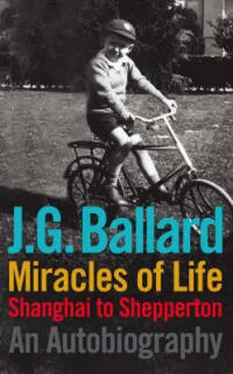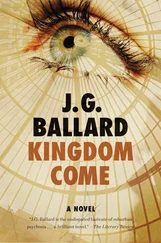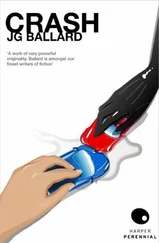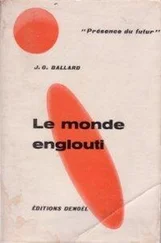There was a burial mound on the edge of an abandoned paddy field three hundred yards from our house. One day, on my way back from school, I made a small detour to the mound, climbed up the rotting pyramid and peered into one of the lidless coffins. The skeleton of a forgotten rice farmer lay on what seemed like a mattress of silk – the soil around him had been endlessly washed and rinsed by the rains. Years later, as a Cambridge medical student, I would sleep in my college room with my anatomy skeleton in a coffin-like pine box under my bed. I was told that the skeleton’s modest height did not mean it was that of a child – most anatomy skeletons were those of south-east Asian peasants.
Despite my heroic cycle trips, my insulation from Chinese life was almost complete. I lived in Shanghai for fifteen years and never learned a word of Chinese. Although my father had a large Chinese workforce, and at one point took Chinese lessons, he never uttered a syllable of Chinese to any of our servants. I never had a Chinese meal, either at home or during the many hotel and restaurant visits with my parents and their friends. We ate roast beef and roast lamb, American waffles and syrup, ice cream sundaes. My first Chinese meal was in England after the war. Today, British and European émigrés to the third world have been educated by television to take an interest in the local history and culture – its cuisine, architecture, folklore and customs. This was not the case in 1930s Shanghai, in part because there was so little of that history and culture available in Shanghai, and partly because of the standoffishness of the Chinese.
And perhaps, after all, too little was hidden in Shanghai. Even as a 10-year-old who had known nothing else, the extreme poverty of the Chinese, the deaths and disease and orphans left to starve in doorways, unsettled me as it must have unsettled my parents. I assume that both had emotionally distanced themselves from what they saw in the Shanghai streets. There were many foreign-run charities which they actively supported, but they probably knew there was very little that even the most sympathetic Westerners could do for the millions of destitute Chinese. My mother travelled everywhere in her chauffeur-driven car, and may well have seen less of poverty than her forever-cycling son. There were also huge numbers of destitute European refugees – White Russians, German and eastern European Jews fleeing from the Nazi threat, English expats down on their luck, political refugees from all over the world who needed no visas to enter Shanghai. As the thousands of bars and nightclubs toasted the even better years to come, and the dancers continued to dance, I cycled up and down the Avenue Foch and the Bubbling Well Road, always on the lookout for something new and rarely disappointed.
In Shanghai the fantastic, which for most people lies inside their heads, lay all around me, and I think now that my main effort as a boy was to find the real in all this make-believe. In some ways I went on doing this when I came to England after the war, a world that was almost too real. As a writer I’ve treated England as if it were a strange fiction, and my task has been to elicit the truth, just as my childhood self did when faced with honour guards of hunchbacks and temples without doors.
Meanwhile, there was a host of treats to look forward to: children’s parties with their conjurors and tumblers; the gymkhana at the riding school where I would pretend to steer my docile nag around a figure-of-eight course, all the beast could remember; the premiere of The Wizard of Oz , attended by the whole school; Saturday ice cream sundaes at the Chocolate Shop, a happy bedlam of small boys, amahs and exhausted nannies; the American Hell-Drivers at the racecourse, crashing their cars through burning walls; a visit to the Chinese theatre in the Old City, a nightmare of earsplitting gongs and grimacing masks; a trip to the jai alai stadium with its ferocious Chinese gamblers and Filipino players with huge scoop-rackets that seemed to propel the ball at rifle speed (the fastest ball game in the world, my father said, which greatly impressed me, as did anything that was fastest, tallest, highest and deepest); chasing the trucks that carried the ever-friendly US Marines, cheering me on until my front wheel jammed in a tramline and I pitched headlong among the Chinese shoppers outside Sincere’s; and regular trips to see the Idzumo moored off the Bund. Yet with all these excitements, I still found myself thinking for a few moments at least of the Chinese beggar-children on the ash-tips near the chemical works by the Avenue Joffre, picking away in the coldest weather for the smallest lumps of coke. It was the gap between their lives and mine that bothered me, but there seemed no way of bridging it.
That gap, and Shanghai itself, would close sooner than I could have guessed.
In September 1939 the European war began, and quickly reached across the world to Shanghai. Outwardly, our lives continued as before, but soon there were empty places in my class at school, as families sold up and left for Hong Kong and Singapore. My father spent a great deal of time listening to the short-wave radio broadcasts from England, which brought news of the sinking of HMS Hood and the hunt for the Bismarck , then later of Dunkirk and the Battle of Britain. School was often interrupted so that we could visit one of the cinemas for screenings of British newsreels, thrilling spectacles that showed battleships in line ahead, and Spitfires downing Heinkels over London. Fund-raising drives were held at the Country Club, and I remember the proud announcement that the British residents in Shanghai had financed their first Spitfire. There was constant patriotic activity on all sides. The German and Italian communities mounted their own propaganda campaigns, and the swastika flew from the flagpoles of the German school and the German radio station, which put out a steady stream of pro-Nazi programmes.
Newsreels soon became the dominant weapon in this information war, many of them screened at night against the sides of buildings, watched by huge crowds of passing pedestrians. I think I saw the European war as a newsreel war, only taking place on the silver square above my head, its visual conventions decided by the resources and limits of the war cameraman, as I would now put it, though even my 10-year-old eyes could sense the difference between an authentic newsreel and one filmed on manoeuvres. The real, whether war or peace, was something you saw filmed in newsreels, and I wanted the whole of Shanghai to be filmed.
The English adults began to talk now about ‘home’, a rose-pink view of England that seemed to consist of the West End of London, Shaftesbury Avenue and the Troc, a glittery sparkle of first nights and dancing till dawn, overlaid by a comfortable Beverley Nichols world of market towns and thatched roofs. Did my parents and their friends convince themselves, or were they keeping their morale up? They played cricket at the Country Club, usually after too many gins, and subscribed to Punch , but they drove American cars and cooled their vermouth in American refrigerators. They talked about retiring, not to the Cotswolds, but to South Africa, with its abundant cheap servants. I think that, despite themselves, they had been internationalised by Shanghai, and their Noël Coward/ Cavalcade notions of England were a nostalgic folk memory (when we arrived in England in 1946, some of us were assumed to be American, and not because of our accents).
This probably explains why many of the British residents stayed on in Shanghai even though it was clear that war against Japan was imminent. There was also the firm belief, racist to a large extent, that while the Japanese had easily routed the Chinese armies they would be no match for the Royal Navy and the Royal Air Force. Japanese pilots flew inferior planes and had notoriously bad eyesight, according to cocktail-party wisdom. But the blinkered vision lay in the eyes of the British, a strange self-delusion bearing in mind that my parents and their friends had seen the ruthless courage of the Japanese soldiers and the skill of their pilots at first hand since 1937.
Читать дальше






